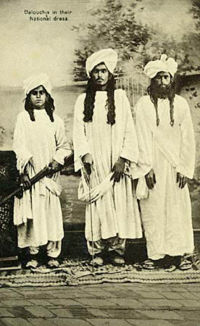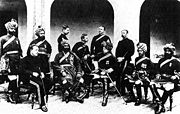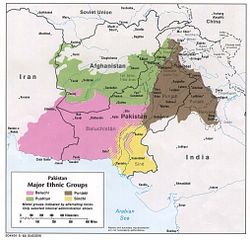Baloch people
From Wikipedia, the free encyclopedia
| Baloch بلوچ Baloosh |
|||||||||||||||||||||||||||||||||
|---|---|---|---|---|---|---|---|---|---|---|---|---|---|---|---|---|---|---|---|---|---|---|---|---|---|---|---|---|---|---|---|---|---|
 |
|||||||||||||||||||||||||||||||||
| Baloch in their national dress, from a 1910 photograph. | |||||||||||||||||||||||||||||||||
| Total population | |||||||||||||||||||||||||||||||||
|
over 15 million [1] |
|||||||||||||||||||||||||||||||||
| Regions with significant populations | |||||||||||||||||||||||||||||||||
|
|||||||||||||||||||||||||||||||||
| Languages | |||||||||||||||||||||||||||||||||
| Balochi | |||||||||||||||||||||||||||||||||
| Religions | |||||||||||||||||||||||||||||||||
|
Islam Sunni (predominantly) and Zikris around Turbat[18][19] [20] |
|||||||||||||||||||||||||||||||||
| Related ethnic groups | |||||||||||||||||||||||||||||||||
| Iranian people Especially Pashtuns, Kurds, Laks, Zazas Persians and Mazandaranis |
The Baloch (بلوچ; alternative transliterations Baluch, Balouch, Balooch, Balush, Balosh, Baloosh, Baloush et al.) are an Iranian people inhabiting the region of Balochistan in Iran and Pakistan as well as neighboring areas of Afghanistan and the southeast corner of the Iranian plateau in Southwest Asia.
The Baloch speak Balochi, which is considered a north-western Iranian language and the Baloch are accordingly generally considered an Iranian people. They mainly inhabit mountainous terrains which have allowed them to maintain a distinct cultural identity and resist domination by neighbouring rulers. The Baloch are predominantly Muslim, with most belonging to the Hanafi school of thought of Sunni Islam, but there are also a significant number of Zikri in Balochistan. Some 70 percent of the total Baloch population live in Pakistan. About 20 percent inhabit the coterminous region of southeastern Iran. Baloch population is estimated at about 4,800,000. In Pakistan the Baloch people are divided into two groups, the Sulaimani and the Makrani, separated from each other by a compact block of Brahui tribes.[21]
Contents[hide] |
[edit] Geographical homeland, demographics, and sub-groups
The Baloch-speaking population is estimated to be in the range of 10 to 15 million. However, the exact number of Baloch and those who are or claim to be of Baloch ancestry is difficult to determine. The Baloch trace their origin back to Aleppo [citation needed] located in northern Syria. In 4th century CE, they started leaving this region and migrated to the south of Caspian sea and later on settled in the mountanious region of south-eastern Iran and western Pakistan.
It is possible that there are more Baloch than simply those who claim Balochi as their mother tongue. This, however, raises the question as to who is and is not a Baloch as many surrounding peoples claim to be of Baloch descent, but do not speak Balochi. The Brahui, having lived in proximity to the Baloch, have absorbed substantial linguistic and genetic admixture from the Baloch and in many cases are indistinguishable. Despite very few cultural differences from the Baloch, the Brahui are still regarded as a separate group on account of language difference. The higher population figure for the Baloch may only be possible if a large number of "Baloch" are included who speak a different languages, such as Seraikis, Sindhi, Panjabi and Brahui, and who often claim descent from Baloch ancestors. Many Baloch outside of Balochistan are also bilingual or of mixed ancestry due to their proximity to other ethnic groups including the Sindhis, Brahui, Persians, and Pashtuns. There are also a large number of Baloch who have been migrating or have been living in adjacent provinces to Balochistan for centuries. In addition, there are many Baloch located in other parts of the world with the bulk living in the GCC countries of the Persian Gulf.
There is a significant population of Baloch in western countries such as Sweden and Australia. It is known that many Baloch settled in Australia in the 1800s and now fourth generation Baloch still live in Australia, mainly in Perth.
Their homeland, Balochistan, is divided between three countries with portions of it in Pakistani Balochistan, Iranian Balochistan, and the southern parts of Afghanistan. Research also has been done by several authors, that the Baloch ancestry goes back to the Median Empire era, when the Baluch tribes or Kurd Tribes were sent to protect the borders of the Median empire in regions of Makran and Toran.
[edit] Balouch in Oman
The Southern Baloch of Oman began migrating from the coastal Baluchistan to the Arab lands some 70 years ago when oil was discovered there. Baloch in Oman have maintained their ethnic and linguistic distinctions. The Southern Baloch compose approximately 19% of the country's population. The traditional Baloch economy is based on a combination of farming and semi-nomadic shepherding.
[edit] Balouch in UAE
[edit] Balouch in Australia
[edit] Balouch in Turkmenistan
[edit] Balouch in East Africa
[edit] History of the Baloch people

The Seljuk invasion of Kerman in the 11th century AD stimulated the eastward migration of the Balochi. The Seljuk ruler Qawurd (Kavurt) sent an expedition against the Kufichis (Qufs), Baloch mountaineers whose banditry had long threatened the region's southern and eastern parts. After suppressing the Baloch, the Seljuks put watchtowers, cisterns, and caravansaries along the desert route to encourage trade with India. The Baloch remained rebellious under Safavid rule (1501–1736). Western Balochistan was conquered by Iran in the 19th century, and its boundary was fixed in 1872. The Iranian government began to assist settlement and economic development in the 1970s by building dams and thermoelectric-power plants, though these efforts slackened after the Iranian Islamic Revolution.[22]
[edit] Languages
| Major Ethnic Groups of Iran |
|---|
|
Balooch
Uninhabited
|
The national language of the Baloch is Balochi. In Balochistan, their second-most commonly spoken language is Brahui whose origin is uncertain, early British linguists labelled it as being a possible proto- Dravidian language but more recent research has thrown this theory into dissaray. Some misunderstanding exists in the West that Brahui speakers are different from Balochi speakers.[citation needed] In fact the Baloch is a single race with many languages.[citation needed] Those who speak Brahui are known as Brahuis (or Brahui Baloch).
The Baloch do not only live in Balochistan (Pakistan) but also are in majority in Sindh, South Punjab, Bahawalpur, Southern Afghanistan, Eastern Iran, Gulf States and Mari region of Turkmenistan. There are also Baloch who migrated and still live on the East African coast in towns such as Mombasa and Dar es-Salaam. The Baloch (Talpur/Leghari) ruled Sindh before the British annexation of Sindh to the British Raj. The Baloch in Sindh, South Punjab and Bahawalpur speak Sindhi and Seraiki.
Baloch society is divided in tens of tribes, some tribes speak Brahui and some speak Balochi, and there are many tribes who speak both. The Marri tribe and the Bugti tribe speak Balochi. Mengal tribe speak Brahui and they live in Chagai, Khuzdar, Kharan and in souther parts of Afghanistan, The Lango tribe, who live in central Balochistan in the Mangochar area, speak Balochi as their first language and Brahui as their second. The Bizenjo tribe that live in the Khuzdar, Nal and parts of Makkura, along with the Muhammadsanis, (one of the largest Baloch tribes) speak both languages. The Bangulzai tribe is a Brahui-speaking tribe but a sub-tribe of the Bangulzai, the Garanis, speak Balochi and are known as Balochi speaking Bangulzais.
The Mazari in Rajanpur speak Balochi while the Leghari the largest Baloch tribe in Dera Ghazi Khan and Rahim Yar Khan speak Seraiki. The Leghari in Sindh speak Sindhi.Kolachi baloch living in the Punjab and Sindh province of Pakistan speak Saraiki while those living in sibi district of Balochistan speak Balochi. The Talpur, Jatoi, Gabol, Lashari, Chandio, Bozdar,Samma and other Baloch tribes settled in Sindh speak both Sindhi and Balochi. Qaisrani baloch living near Taunsa Sharif speak Saraiki while their clansmen living the Dera Ghazi Khan tribal areas speak Balochi.
[edit] Famous Balochi Tales
- Chakar Khan
- Hamal Rando - Hanaz
- Berang-o-Grahan
- Nazshah Hured Dahanni
- Sassi Punnun
- Hani-o-Sheh Murid
- Azziat-o-Mehruk
- Dad Shah
[edit] See also
- Baloch tribes
- Brahui people
- Balochi Dialects
- Balochi History
- Balochistan
- Demographics of Iran
- Demographics of Pakistan
- Demographics of Afghanistan
- Demographics of Oman
- Demographics of United Arab Emirates
- Demographics of Kuwait
- Mehergarh
- Bashkardi
- Koroshi
[edit] References
- Note: population statistics for Baloch (including those without a notation) in foreign countries were derived from various census counts, the UN, the CIA World Factbook, Ethnologue, and the Joshua Project.
- ^ Eastern Baloch, Ethnologue.com (retrieved 7 July 1998)
- ^ Population by Mother Tongue, Population Census Organization, Government of Pakistan (retrieved 7 June 2006)
- ^ Census of Afghans in Pakistan, UNHCR Statistical Summary Report (retrieved 10 October 2006)
- ^ Languages of Iran, Ethnologue.com (retrieved 7 June 2006)
- ^ Western Baloch, Ethnologue.com (retrieved 7 June 2006)
- ^
- ^ Southern Baloch in Oman, joshuaproject.net (retrieved 7 June 2006)
- ^
- ^ Southern Baloch in UAE, joshuaproject.net (retrieved 7 June 2006)
- ^ a b c d e f
- ^ Baloch in India, joshuaproject.net (retrieved 21 August 2007)
- ^ Western Baloch in Turkmenistan, Ethnologue.com(retrieved 7 June 2006)
- ^ [[1], joshuaproject.net (retrieved 7 June 2006)
- ^ People in Kuwait, Ethnologue.com (retrieved 7 June 2006)
- ^ Baloch people in Qatar, Joshuaproject.net (retrieved 21 August 2007)
- ^ Baloch in Saudi Arabia, joshuaproject.net (retrieved 21 August 2007)
- ^ Baloch in Somalia, joshuaproject.net (retrieved 21 August 2007)
- ^ [2]
- ^ [3]
- ^ [4]
- ^ [5]
- ^ Balochi People, Encyclopaedia Britannica.
[edit] External links
- Baask - Home of Balochi Literature
- www.turbat.org
- www.secretarabianjournal.blogspot.com/2006/02/getting-cross-cultural-khaleeji-tent.html
- www.joshuaproject.net/languages.php?rol3=bcc
| [hide]
|
|
|---|---|
|
Major: Persians (51%) • Azeris (24%) • Guilaki and Mazandarani (8%) • Kurds (7%) • Arabs (3%) • Baloch (2%) • Lurs (2%) • Turkmens (2%) |
|


